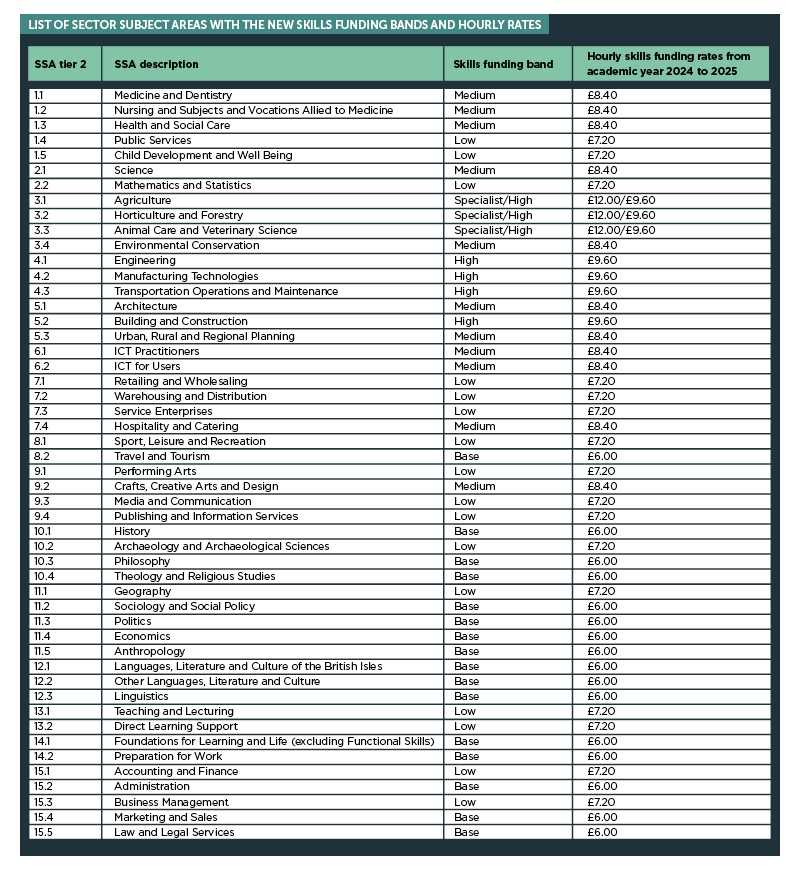Increased funding rates for “priority” adult education courses have been revealed by the Education and Skills Funding Agency.
But functional skills courses in English and maths will not see any base increase.
The government’s delayed reforms to adult education funding bring together multiple funding streams to a single new skills fund in 2024/25. Ministers have said reforms are designed to simplify the system and incentivise “priority” skills.
New rates will apply to ESFA grant funded and procured provision, with mayors in devolved areas setting their own rates.
Courses under the new skills fund will be organised along five new hourly bands that range from £6 to £12 by their sector subject area.
This replaces the current “single activity matrix” which organises funding along fifteen possible funding bands.
Under the new system from 2024/25, courses in travel and tourism will attract the lowest base rate of £6 per hour and engineering the high rate of £9.60 per hour.
There is a higher “specialist” band of £12 per hour for certain land-based courses, however officials are still reviewing which subjects receive the “specialist” band and which receive the “high” funding band.

The hourly band is then multiplied by a qualification’s guided learning hours to give a funding rate. Adjustments for disadvantage and area costs will apply as they do now.
For example, a diploma in engineering is 360 guided learning hours and currently receives £2,583. From 2024/25, the new funding rate for this qualification will be £3,456, calculated as follows: £9.60 (the new hourly skills funding rate for engineering sector subject area) multiplied by 360 guided learning hours.
Courses which are eligible under the government’s free courses for jobs offer will continue to receive extra funding: £600 for qualifications at or above 360 guided learning hours and £150 for courses at 359 guided learning hours or below.
The announcements isn’t all good news for providers delivering functional skills English and maths courses, which have been confirmed today to continue to be funded at their current rates.
New digital qualifications though will be funded by the new band for ICT for users, which is £8.40, meaning funding for a 55 guided learning hour qualification will increase to £462 from the current £336 for the functional skills ICT qualification.
Access to higher education courses will also be moved to the new five band system depending on their subject area.
Skills minister Robert Halfon said: “We are simplifying the way we fund skills training for adults so that more people can climb the ladder of opportunity into well paid jobs, and we can better meet the skills needs of employers and the economy.
“Our new funding reforms will ensure we are targeting money at the subjects and sectors with the greatest skills need, while giving providers the flexibility to develop innovative training solutions that work for their local communities.”
















These changes will have LOTS of consequences and while it may be portrayed as simplification, it won’t be for providers or learners.
For devolved areas, over the last few years, they have essentially copied the methodology of the single activity rates matrix, with a few tweaks to the figures within the matrix. Now that ESFA are implementing a new method (ie rate per SSA tier 2 as opposed to an amount for range of hours), Devolved areas will have to decide whether they adopt that or go their own ways.
And don’t forget that by 24/25 there will be many more devolved areas.
So, any providers near borders face the probability of multiple different funding methods and / or rates for the same courses, depending on the postcode of the learner (as devolved areas are probably not going to want to fund out of area learners and if they do they will fund them at their rates, not the rates determined by the areas where the learner lives).
For providers to effectively plan, forecast income and funding generation and implement pricing and fee strategies is anything but simplification.
On English and Maths, I working on the assumption that they’ve left the functional skills rates the same as it would stir up even more trouble with apprenticeship providers who are paid a lower rate already…
I absolutely agree on the questions regarding devolution. There are significant problems already with regard to funding and eligibility – as a non-devolved area adjoining a combined authority, we are funded to work with learners on the other side of the country, but not the other side of the motorway – and these will only get worse as devolution is rolled out to all by 2030. Will we end up only being able to support learners who live within the geographical boundaries of our local authority? Will we have to deal with the administrative burden of working to multiple different funding regimes? How can such Balkanisation possibly be in the interests of learners? I have to date seen no evidence that anyone in the DfE has given consideration to these questions, but I would be happy if someone could prove me wrong.